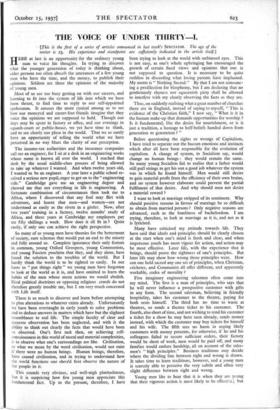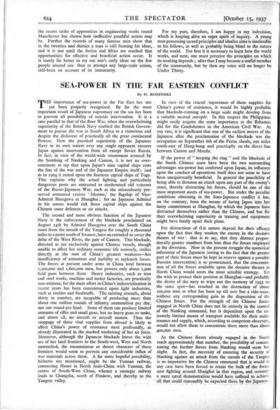THE VOICE OF UNDER THIRTY-I.
[This is the first of a series of articles announced in last week's SPECTATOR. The age of the writer is 23. His experience and standpoint are sufficiently indicated in the article itself.] HERE at last is an opportunity for the ordinary young man to voice his thoughts. In trying to discover what the younger generation of today is thinking about, older persons too often absorb the utterances of a few young men who have the time, and the money, to publish their opinions. Seldom are these the opinions of the majority of young rnen.
Most of us are too busy getting on with our careers, and learning to fit into the system of life into which we have been thrust, to find time to reply to our self-appointed spokesmen. It amuses the more cynical among us to see how our moneyed and career-free friends imagine that they voice the opinions we are supposed to hold,. Though our days may be spent in factory or office, and our evenings in squash-court or public-house, we yet have time to think, and to see clearly our place in the world. That we so rarely have an opportunity of telling the world what we have perceived in no way blurs the clarity of our perception.
The income-tax autlorities and the insurance companies call me an engineer, for I sit at a desk in an engineering works whose name is known all over the world. I reached that desk by the usual middle-class process of being allowed to take up whatever I wanted. And when twelve years old, I wanted to be an engineer. A year later a public school re- ceived a serious new pupil, eager to get on to the "engineering side." Cambridge gave me an engineering degree and showed me that not everything in life is engineering. A fortunate combination of circumstances then took me to Africa, where I discovered that any fool may ffirt with adventure, and learnt that men—and women—are not understood as easily as the rivets in a girder. Now, after two years' training in a factory, twelve months' study of Africa, and three years at Cambridge my employers pay me fifty shillings a week. How does it all fit in ? Quite easily, if only one can achieve the right perspective.
So many of us young men have theories for the betterment of society, sure schemes that would put an end to the misery and folly around us. Complete ignorance their only feature in common, young Oxford Groupers, young Communists, and young Fascists proclaim that they, and they alone, have found the solution to the troubles of the world. But I hardly think the world is to be righted so easily. In our haste to "put things right" we young men have forgotten to look at the world as it is, and have omitted to learn the habits of the men whose mean actions we would abolish. Rival political doctrines or opposing religious creeds do not therefore greatly trouble me, but I am very much concerned with Life itself.
There is so much to discover and learn before attempting to plan alterations to whatever exists already. Unfortunately we have been overtaught in early youth to solve problems and to deduce answers in matters which have but the slightest resemblance to real life: The simple faculty of clear and accurate observation has been neglected, and with it the ability to think out clearly the facts that would have been so observed. One's first task then, on achieving self- consciousness in this world of moral and material complexities, is to observe what one's surroundings are like. Civilisation, or what we mean by the word civilisation, would not exist if there were no human beings. Human beings, therefore, have caused civilisation, and in trying to understand how the world functions -one should first observe the nature of the people in it.
This sounds very obvious, and well-nigh platitudinous, but it is surprising how few young men appreciate this fundamental fact. Up to the present, therefore, I have been trying to look at the world with unbiassed eyes. This is not easy, as one's whole upbringing has encouraged the growth of certain fixed views and opinions that one is not supposed to question. It is necessary to be quite ruthless in discarding what loving parents have implanted. My motto is "Nothing Sacred." By that I am not announc- ing a predilection for blasphemy, but I am declaring that no gentlemanly shyness nor squeamish piety shall be allowed to interfere with my clearly observing the facts as they are.
Thus, on suddenly realising what a great number of churches there are in England, instead of saying to myself, "This is evidence of the Christian faith," I now say, "What is it in the human make-up that demands opportunities for worship ? Is it fundamental, like the desire for nourishment, or is it just a tradition, a homage to half-beliefs handed down from generation to generation ? "
Before questioning the rights or wrongs of Capitalism, I have tried to separate out the human emotions and instincts which after all have been responsible for the evolution of capitalism. A change of system, to Socialism say, would change no human beings : they would remain the same. So many young Socialists fail to realise that a father Would still pull strings to get his son a good job whatever the system was in which he found himself Men would still desire to gain material profit from the efficiency of their own brains, and no system however elaborate could prevent the partial fulfilment of that desire. And why should men not desire a material reward ?
I want to look at marriage stripped of its sentiment. Why should positive reasons in favour of marriage be so difficult to obtain from married persons? Only negative reasons are advanced, such as the loneliness of bachelordom. I am trying, therefore, to look at marriage as it is, and not as it is lyricised.
Many have criticised my attitude towards life. They have said that ideals and principles should be clearly chosen at the start when one's mind is fresh and clear, and when impetuous youth has most vigour for action, and action may be most effective. Later life, with the experience that it brings, should prove the rightness of one's principles. But later life may show how wrong those principles were. How can one hold sacred any one set of principles, when Christian, cricketer, and Communist all offer different, and apparently workable, codes of morality ?
Five imaginary engineering salesmen often come into my mind. The first -is a man of principles, who says that he will never influence a prospective customer with gifts in any form. The second salesman, believing in friendly hospitality, takes his customer to the theatre, paying for both seats himself. The third has no time to waste at theatres, so sends a theatre ticket to his customer. The fourth, also short of time, and not wishing to send his customer a ticket for a show he may have seen already, sends money instead, with which the customer may buy tickets for himself and his wife. The fifth sees no harm in urging likely customers with money presents, for otherwise, if he and his colleagues failed to secure sufficient orders, their factory would be short of work, men would be paid off, and many families would endure hardship, all on account of the sales- men's "high principles." Business traditions may decide where the dividing line between right and wrong is drawn. It takes time to learn traditions, however, and d young man is scarcely able to perceive the very subtle and often very slight difference between right and wrong.
Young men like to hear that it is when they are young that their vigorous action is most likely to be effective ; but the recent strike of apprentices in engineering works round Manchester has shown how ineffective youthful action may be. Further the records of many famous men show that in the twenties and thirties a man is still forming his ideas, and it is not until the forties and fifties are reached that opportunities for effective and beneficial action occur. It is surely far better to try out one's early ideas on the few people around one than to attempt any large-scale action, still-born on account of its immaturity. For my part, therefore, I am happy in my indecision, which is keeping alive an eager spirit of inquiry. A young man possessing sacred principles and idealist aims is intolerable to his fellows, as well as probably being blind to the nature of the world. For first it is necessary to learn how the world works, and next, one must perceive the principles on which its working depends ; after that I may become a useful member of the community, but by then my voice will no longer be Under Thirty.























































 Previous page
Previous page